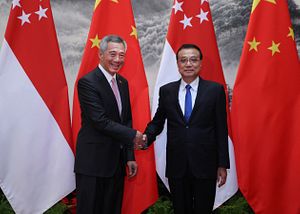Lots of events in 2016 testified to uneasiness between China and Singapore, including Singapore’s support for an international arbitration ruling in July 2016, which denied China’s maritime sovereignty rights in the South China Sea, and the impounding of nine Singapore Armed Forces armored personnel carriers by Hong Kong customs in November 2016. Singapore’s actions touched the baseline of China’s national interests; thus China played hardball.
This year, in May, Singapore’s Prime Minister Lee Hsien Loong was not invited to the Belt and Road Forum in Beijing, even though the Lion City is a pivotal player in China’s Belt and Road Initiative. This seemed to signal that tensions between the two countries would continue through 2017. However, in September, Lee paid a state visit to Beijing, denoting the end of the cold spell in bilateral relations. Numerous commentators argued that the two countries had restored their normal ties after the meeting between President Xi Jinping and Lee. Indeed, Lee’s visit indicated that China-Singapore relations were back on track. But if we review the various communication activities in 2017 more broadly, the relationship between the two states is not only back to normal — it is moving forward.
Normal communication between leaders of the two countries was restored in 2017. Premier Li Keqiang met with Deputy Prime Minister Tharman Shanmugaratnam of Singapore in June this year. During the meeting, Li has accepted an invitation to make an official visit to Singapore. Although no date has been announced by China’s government, the acceptance still indicated a restored warmth between the two countries. In addition, Xi met with Lee on several different occasions, including the sidelines of the G20 summit in Hamburg, Germany in July. What’s more, since 2012, Lee has visited China every year and 2017 was no exception. Although Lee did not attend the Belt and Road Forum, he made a state visit to Beijing in September, meeting with both Xi and Li separately.
In 2017, ministerial meetings between the two countries were on their normal track as well. Chinese Foreign Minister Wang Yi met with his Singaporean counterpart four times in 2016. As of November 2017, the two ministers have met with each other six times, including four meetings with detailed official and media coverage. The foreign ministers weren’t alone in maintaining exchanges; others also followed the trend. For example, Zhao Leji, then the minister of the Organization Department of the Chinese Communist Party Central Committee (and recently elevated to China’s Politburo Standing Committee), co-chaired the 6th Singapore-China Leadership Forum in Singapore in May 2017. In August, Chan Chun Sing, the minister in Singapore’s Prime Minister’s Office, visited various cities and provinces in China, aiming at pushing forward the connectivity project between the two states.
Aside from the meetings held between officials, the depth of the China-Singapore relationship in 2017 can be also traced through signed documents and ongoing negotiations. In February, 2017, the 13th round of the bilateral Joint Council for Bilateral Cooperation (JCBC) was held in Beijing. After the meeting, four agreements were signed, all of which aim at deepening existing cooperation projects, including the Tianjin Eco-City, Chongqing connectivity project, Guangzhou Knowledge City, and Suzhou Industrial Park. In October, the 4th round of China-Singapore FTA Upgrading Negotiations was held in Singapore.
On the security front, in September, Chinese Defense Minister, Chang Wanquan and his Singaporean counterpart, Ng Eng Hen, agreed to begin a new round of army and naval exercises (the latest army exercise between the states was in 2014 while the most recent naval drill happened in 2016).
The relationship between the two state is not only back to normal, as evidenced by the above regular exchanges, but has been moving forward.
For decades, Singapore and China have focused on economic and cultural cooperation; the former is the legacy of Lee Kuan Yew and Deng Xiaoping’s policies while the latter is largely because the majority in Singapore is of Chinese ethnicity. Now the two states have initiated cooperation in new areas. In August, the first joint legal and judicial roundtable between China and Singapore was held in Beijing and a memorandum of understanding on cooperation was signed by Zhou Qiang, chief justice and president of the Supreme People’s Court (SPC) of China, and Chief Justice of Singapore Sundaresh Menon. It’s a milestone in the development of the two countries’ bilateral relation.
In December, Singapore and Shandong province decided to boost cooperation in three key areas: food products, modern services, and energy. There are already several cooperation projects between Singapore government and local governments – Suzhou Industrial Park with Jiangsu province focuses on innovation; Guangzhou Knowledge City with Guangdong province focuses on intellectual property, Tianjin Eco-City on environment and resources as well as Chongqing projects on connectivity. Shandong province is paying attention, and is very likely to become the next local government to formulate cooperation projects with Singapore.
Looking back at 2017, although worries spread when Lee was absent from the Belt and Road Forum while 28 heads of state attended, the later developments between Singapore and China denote that the bilateral relationship is not only back normal, but has also moved forward. More progress can be hoped for in 2018 and beyond.
Xirui Li is a research assistant in the School of International Studies/Academy of Overseas Chinese Studies/Institute for 21st Century Silk Road Studies at Jinan University inChina.

































